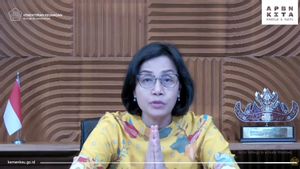JAKARTA - Chief Economist & Investment Strategic PT Manulife Asset Manajemen Indonesia Katarina Setiawan said that the upcoming 2024 general election (election) has the potential to encourage the growth of Indonesia's Gross Domestic Product (GDP).
This is because it enters the campaign period in the fourth quarter of 2023, government spending is projected to increase domestic consumption.
"In the second half of this year, higher government spending and starting to roll out funds from the election budget can increase domestic consumption, which is expected to support Indonesia's GDP growth," said Katarina at the 'Market Update: No Harsh Landing' webinar held by Manulife Aset Manajemen Indonesia (MAMI) virtually in Jakarta, quoted from Antara, Wednesday, August 16.
In addition, the budget for the 2024 election campaign is also the largest budget compared to the previous election period.
Furthermore, in terms of the domestic market, Katarina said that Bank Indonesia (BI) will continue to maintain interest rates at the current level, namely 5.75 percent while waiting for the decision of the US Central Bank or the Fed.
This is because the current interest rate is considered sufficient to withstand inflation and the difference in BI interest rates against the Fed is getting narrower.
The control of the Rupiah exchange rate is carried out by BI through other instruments, such as foreign exchange intervention by using foreign exchange reserves and an operation twist program. Meanwhile, the high trade surplus since 2020 has not necessarily pushed for an increase in foreign exchange reserves.
"This condition shows the reluctance of exporters to convert export proceeds to local currencies because interest rates are less attractive. Regulations requiring the planting of Export Results Funds for the minimum amount of exports of 250 thousand US dollars over three months are expected to increase the liquidity of the domestic dollar in large amounts and help maintain the stability of the Rupiah exchange rate," he said.
Indonesia's inflation rate also continued to show a further decline in June 2023 until it returned to the target range at the level of 3+1 percent, faster than originally estimated.
This realization became the lowest since 14 months ago. The return of inflation to the target is the result of the consistency of monetary policy and the close synergy of inflation control between BI and the government, both at the central and regional levels.
BI sees the current policy as sufficient to bring inflation to the range of inflation targets of 3.01 percent in 2023 and 2.5 to 1.5 to 1 percent in 2024. Indonesia's economic indicators show an increase in domestic activity. This is indicated by several things, including a well-maintained level of consumer confidence, so as to encourage public consumption interest.
اقرأ أيضا:
In addition, investment indicators also show a recovery trend and BI supports lending by cutting the RRR (reserve requirement ratio) to meet the needs of funds from various business sectors.
However, Katarina continues to encourage investors to be aware of several risks. First, the impact of central bank policies on global economic growth and developing country monetary policy.
Second, geopolitical factors that can create uncertainty in various policies and their impact on investment sentiment. In addition, ahead of the election, investment and capital expenditure are expected to decline.
Third, commodity prices that are expected to experience normalization can certainly have an impact on economic growth, foreign exchange reserves, and fiscal deficits.
The English, Chinese, Japanese, Arabic, and French versions are automatically generated by the AI. So there may still be inaccuracies in translating, please always see Indonesian as our main language. (system supported by DigitalSiber.id)















